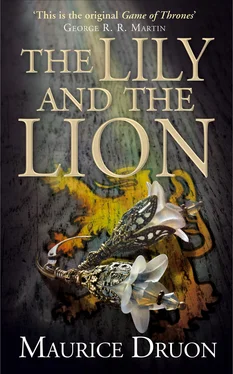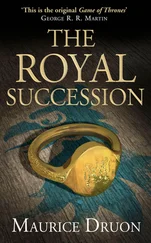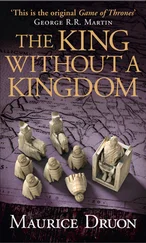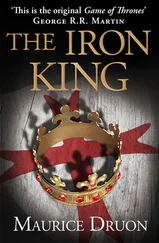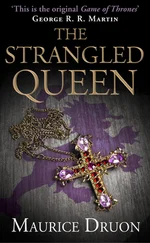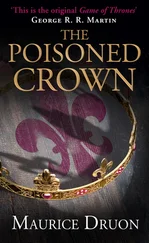In an attempt to win God’s mercy, Charles IV therefore insisted on recording his concern for the Holy Land in his will: ‘For my intention,’ he dictated, ‘is to go there during my lifetime and, if that proves impossible, fifty thousand livres shall be allotted to the first general expedition to set out.’
This was not at all what was required of him, nor indeed that he should encumber the royal finances, which were urgently needed for more pressing matters, with such a mortgage. Robert was furious. That fool Charles was being stubborn to the last!
Robert merely wanted him to leave three thousand livres each to Chancellor Jean de Cherchemont, Marshal de Trye and Messire de Noyers, the President of the Exchequer, on account of their loyal services to the Crown – and, incidentally, because they sat on the Council of Peers by right of their appointments.
‘What about the Constables?’ murmured the dying King.
Robert shrugged his shoulders. Constable Gaucher de Châtillon was seventy-eight years old, deaf as a post, and so rich he did not know what to do with his money. You did not develop a sudden love of gold at his age. The Constable’s name was crossed out.
On the other hand, Robert proved most helpful to Charles in the matter of appointing executors, for this would establish a sort of order of precedence among the great men of the realm. Count Philippe of Valois headed the list, then came Count Philippe of Evreux, and then Robert of Artois, Count of Beaumont-le-Roger, himself.
Having dealt with the will, Robert now turned his attention to the spiritual peers.
Guillaume de Trye, Duke-Archbishop of Reims, had been Philippe of Valois’ tutor; and Robert had had his brother, the Marshal, put into the royal will for three thousand livres, which he made ring to good effect. There would be no difficulties in that direction.
The Duke-Archbishop of Langres had long been a supporter of the Valois, as had also Jean de Marigny, Count-Bishop of Beauvais, who had even betrayed his brother, the great Enguerrand, to serve the hatreds of the late Monseigneur Charles of Valois.
There remained the Bishops of Châlons, Laon and Noyon; and these, it was known, would follow Duke Eudes of Burgundy.
‘As for the Burgundian,’ cried Robert of Artois, with a wide sweep of his arms, ‘he’s your affair, Philippe. I can do nothing with him; we’re at daggers drawn. After all, you married his sister and you must be able to bring some pressure to bear on him.’
Eudes IV was no diplomatic genius. But he remembered the lessons he had learned from his mother, Agnes of France, the last surviving daughter of Saint Louis, who had died the preceding year, and how the determined old woman had succeeded in negotiating, during Philippe the Long’s regency, the reuniting of the County of Burgundy and the duchy. Eudes had then married Mahaut of Artois’ granddaughter, who was twenty-seven years younger than himself, but he no longer complained of this now that she was nubile.
The question of the Artois inheritance was the first subject he discussed with Philippe of Valois, when they were closeted together on his arrival from Dijon.
‘It is quite understood, of course, that at Mahaut’s death, the County of Artois goes to her daughter, Queen Jeanne the Widow, with remainder to the Duchess, my wife, is it not? I must make a point of this, Cousin, for I well know Robert’s pretensions to Artois; he has proclaimed them enough!’
These great princes were as bitter in defence of their right of inheritance to a quarter of the kingdom as were the daughters-in-law of the poor in squabbling over cups and sheets.
‘Judgement has twice been given assigning Artois to the Countess Mahaut,’ replied Philippe of Valois. ‘Unless any new facts come to light supporting Robert’s claim, Artois will go to your wife, Brother.’
‘You see no impediment?’
‘None at all.’
And thus the loyal Valois, the gallant knight, the hero of tournaments, had now given two contradictory promises.
Nevertheless, honest in his duplicity, he told Robert of Artois of his conversation with Eudes, and Robert wholly approved it.
‘The main thing,’ he said, ‘is to acquire Burgundy’s vote. What does it matter that he should feel secure in a right which is not his anyway? New facts, you said? Very well, we’ll produce some, and I won’t make you break your word. Don’t worry, it’s all for the best.’
They had now merely to wait for one last formality – the King’s death. It was to be hoped it would not be long delayed, for this splendid conjunction of princes in support of Philippe of Valois might not endure.
The Iron King’s last son died on the eve of Candlemas, and the news of his death spread through Paris the next morning, together with the odour of the hot flour of pancakes.
Robert of Artois’ plans seemed to be working perfectly when, on the very morning the Council of Peers was to be held, a thin-faced, tired-eyed English bishop arrived in a mud-stained litter to urge the claims of Queen Isabella.

THERE WERE NO BRAINS in the head now, no heart in the breast, nor entrails in the stomach. He was a hollow king. But, indeed, there was little difference between Charles IV alive and now that the embalmers had done their work. He had been a backward child, whom his mother had called ‘the Goose’, a cuckolded husband, and an unsuccessful father, for he had vainly, if stubbornly, endeavoured to assure the succession by marrying three times; he had also been a weak prince, first subject to an uncle and then to cousins, indeed but a fleeting incarnation of the royal entity.
On the state bed, at the far end of the great pillared hall of the Castle of Vincennes, lay his corpse, clothed in an azure tunic, a royal mantle about its shoulders and the crown on its head.
By the light of the massed candles, the peers and barons gathered at the other end of the hall could see the gleam of the corpse’s boots of cloth of gold.
Charles IV was presiding over his last Council, which was known as ‘the Council in the King’s Chamber’, for he was deemed to be ruling still. His reign would end officially only on the following day, when his body was lowered into the tomb at Saint-Denis.
Robert of Artois had taken the English bishop under his wing, while they waited for the latecomers.
‘How long did it take you to get here? Twelve days from York? You can’t have wasted much time saying masses on the way, Messire Bishop. You’ve made as much speed as a courier! Did your young King’s wedding go off well?’
‘I expect so. I was unable to take part in it, for I was already on my way,’ replied Bishop Orleton.
And was my Lord Mortimer in good health? Lord Mortimer was a good friend, and had often mentioned Monseigneur Orleton who had organized his escape from the Tower of London. It had been a great exploit on which Robert complimented the Bishop.
‘Well, you know, I welcomed him to France,’ he said, ‘and provided him with the means of returning somewhat better armed than he had arrived. So we are each responsible for half the business.’
And how was Queen Isabella, his dear cousin? Was she as beautiful as ever?
By his idle chatter Robert was deliberately preventing Orleton from mingling with the other groups, speaking to the Count of Hainaut or the Count of Flanders. He knew Orleton well by reputation and he mistrusted him. Was not this the man whose turbulent career had stirred all England, who had been sent by the Court of Westminster on embassies to the Holy See, and who was the author, so at least it was said, of the famous letter with the double meaning – ‘ Eduardum occidere nolite …’ – by which Queen Isabella and Mortimer had hoped to avoid suspicion of having ordered the murder of Edward II?
Читать дальше
